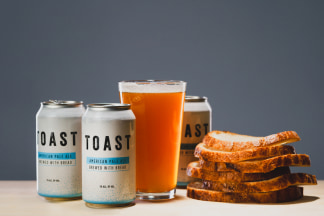Originally published by MACH on February 22, 2018. Written by Denise Chow.
If you’re passionate about craft brews and green living, how about raising a glass of beer made from leftover bread?
Toast Ale launched in the U.K. in 2015 in part to help bakeries recycle bread that otherwise would have been wasted — and to help raise public awareness about wasted food.
“Food waste is one of the most important environmental issues of our time,” says Joanna Ehrenreich, Toast Ale’s head of operations in New York City, where the company set up shop last July. “We want to win over the hearts and minds of people who might otherwise not really pay attention to food waste. I’m very motivated by that.”

One-third of all food produced in the U.S. goes to waste, according to the U.S. Environmental Protection Agency. And the same proportion of bread baked in the U.S. goes uneaten, according to Ehrenreich. Wasted food typically winds up in landfills, where it rots and releases large amounts of methane—a potent greenhouse gas that contributes to global warming.
But can a small company like Toast Ale really make a difference? Emily Broad Leib, director of the Food Law and Policy Clinic at Harvard Law School in Cambridge, Massachusetts, certainly thinks so.
“Grain products such as bread are some of the most commonly wasted food products in both the U.S. and the U.K.,” Broad Leib told NBC News MACH in an email. “Business models that find new uses for surplus bread therefore have significant potential to help reduce the amount of food that is wasted.”
Darby Hoover, a senior resource specialist in the food and agriculture program at the Natural Resources Defense Council, a nonprofit environmental advocacy organization in New York City, echoed Broad Leib’s assessment. “We love to see companies actively repurposing what would have been wasted food and turning them into useful products,” she said, adding that Toast Ale is a good example of a viable food recovery initiative.
Such initiatives are increasingly popular. Many supermarkets now repurpose misshapen or otherwise imperfect produce that traditionally has been wasted, for example, and some restaurants build dishes around ingredients, such as beet greens, that are commonly cut off and thrown away.
Toast Ale partners with specific bakeries to get surplus bread. In New York City, the leftover bread comes from a family-owned organic bakery, Ehrenreich said. The company’s brewing process is similar to that used to brew conventional beer — only it substitutes bread for one-third of the barley used in brewing. And Ehrenreich says Toast Ale’s beers taste similar to their conventionally brewed counterparts.
In the U.S., Toast Ale beer is sold in New York City and Long Island and can be purchased online, with profits donated to charities and local food organizations that work to curb food waste, the company says. But Toast Ale has also shared its recipe online so home brewers can join the fight against food waste. As Ehrenreich puts it, “We want to inspire a movement worldwide.”


Health Law & Policy, Commentary
Gearing Up for 2025: Advocates Share Challenges and Opportunities – Health Care in Motion
December 18, 2024